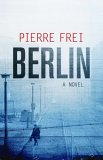Berlin: whodunit with a difference
My rating: 5 of 5 stars
This is a whodunit with a difference. Well, with several differences. It’s about a serial killer, and quite a lot of crime novels are about that.
The most notable difference is that it pays as much attention to the victims as it does to the killers or the cops.
In many crime novels the victims are simply dead bodies, and the police investigating the crime have to identify them to find out who they were, and very often the reader knows little more about them than the police. In this case, however the story deals with them as real people with a history. One effect of this is to make one conscious of the enormity of murder. It is not simply a puzzle to be solved. It brings to an end, unexpectredly and with little warning, the life of a person with hopes and fears and loves and relationships.
Another difference is that it is set in Berlin in 1945, immediately after the end of the Second World War. After so much killing on an industrial scale, it requires a change of mental gears to deal with peacetime crimes. When so many people have died violent deaths in the previous few months, what do one or two more matter? So it is about a society in transition, and seeking to recover mormality.
Another difference, related to the last, is that it gives a picture of life in Berlin, not merely at the time in question, but over the previous 20 years. It shows how ordinary people responded to the rise of the Nazis to power, their behaviour in power, and how they responded to the war. I think that, quite apart from the plot and the characters, which are very good, this aspect of the setting may be the best feature of the book.
How do I know this?
I was 4 years old in 1945, and did not visit Germany until 20 years later. So how can I judge that the picture of life in Nazi Germany is accurate and authentic?
I think I can know by extension. I know that A Dry White Season tells it like it was in apartheid South Africa, even though it is a work of fiction, because I lived through the period. And this book has the same flavour of authenticity. It shows the ambiguities and inconsistencies and contradictions of living in an increasingly authoritarian society, and is worth reading for that alone.





